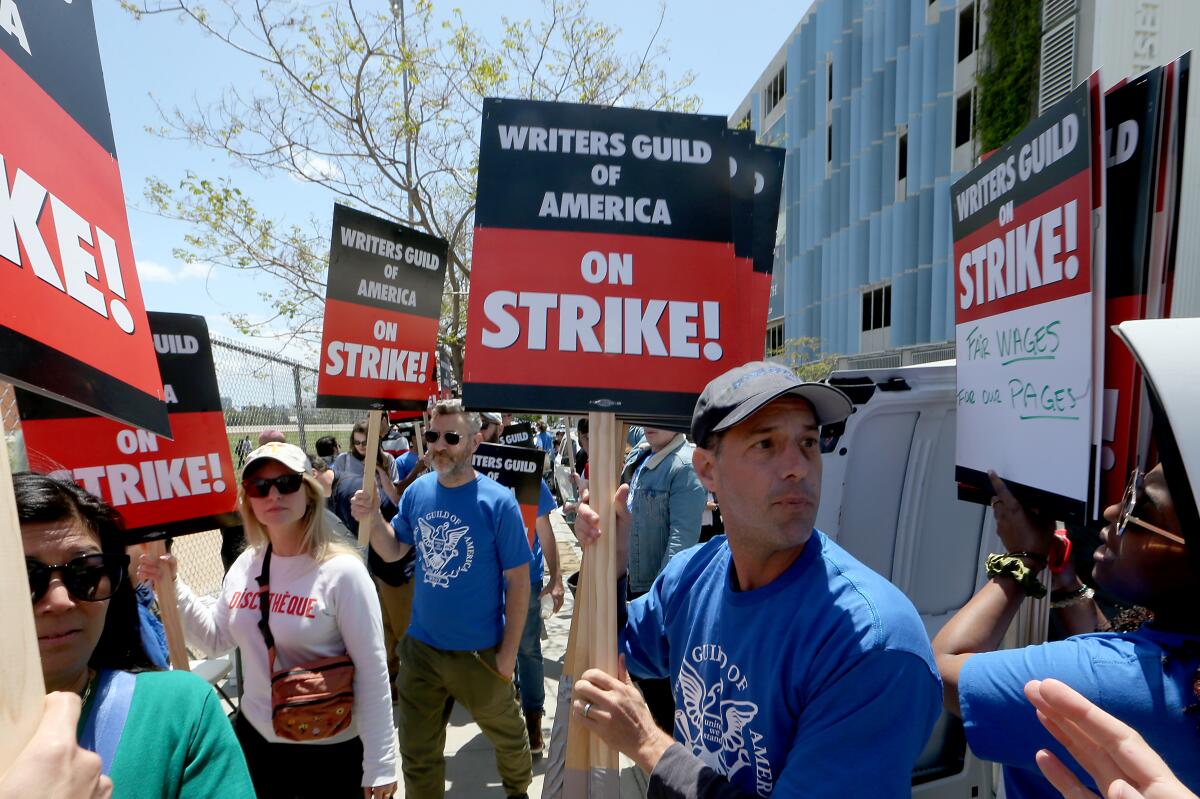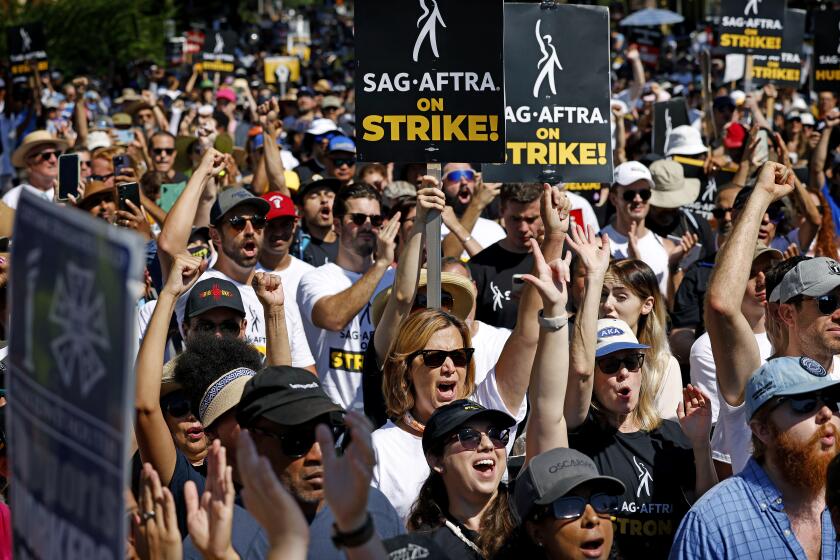Newsom in the hot seat after California passes bill to give striking workers unemployment benefits

- Share via
Striking workers in California, potentially including writers and actors still picketing Hollywood studios, would be eligible for unemployment benefits under legislation state lawmakers passed on Thursday.
Gov. Gavin Newsom now faces a critical decision on whether to sign the bill into law and help provide financial relief to striking entertainment workers and other union members walking out during an era of rising tensions between labor and employers in California.
Under Senate Bill 799, California would become one of the few states that allow striking workers to collect unemployment benefits, joining New York and New Jersey. The bill, as strongly supported by labor unions as it was opposed by the California Chamber of Commerce, would allow striking workers to collect unemployment benefits after being on strike for two weeks.
If the governor signs the bill, it would take effect in January.
Newsom has been taking a backstage role as the Hollywood strikes drag on for more than 100 days, emphasizing he’s working with both sides.
At an event hosted by Politico on Tuesday, the governor expressed concerns about the unemployment insurance fund’s debt but didn’t say whether he would veto the bill. California’s unemployment fund is more than $18 billion in debt after it borrowed money from the federal government to pay for unemployment benefits.
“I think one has to be cautious about that before you enter the conversation about expanding its utilization,” Newsom said.
Democrats, on the other hand, have been voicing their support for the unions.
“We want people to be able to pay their rent and want people to be able to put food on their table during a strike or not during the strike. It’s the right thing to do,” Sen. Anthony Portantino (D-Burbank), who wrote the bill, said on the Senate floor.
The bill cleared the Senate on Thursday with Republicans opposing the legislation because of concerns it would harm businesses and “put the thumb on the scale” in favor of labor unions.
In California, unemployment pay is $450 per week for a maximum of 26 weeks. To be eligible for unemployment, Californians have to meet other requirements, such as conducting a reasonable effort to search for work.
Labor unions, including the Writers Guild of America and SAG-AFTRA, have been pushing for the bill’s passage in committee hearings. On Sept. 7, members of those unions also held a rally about SB 799, urging lawmakers to pass the legislation. Unions have strike funds to help workers pay their bills, but union leaders say that isn’t enough, especially as strikes drag on for months.
The Assembly passed the bill on Monday.
Assemblymember Bill Essayli (R-Corona) said on the Assembly floor that the legislation was fundamentally unfair to businesses since the state would in essence be taking the side of striking union members during a labor dispute.
“By doing this, we’re giving one side an advantage,” said Essayli, who voted against the bill along with other Republicans. “You’re subsidizing, with tax dollars, the labor side.”
Assemblymember Lori D. Wilson (D-Suisun City) voted for SB 799 but also expressed concerns about the unemployment fund’s debt and who is eligible for those benefits.
“We have to deal with this issue of it being underfunded. We have to deal with this issue of who it encompasses,” she said on the Assembly floor.
The California Chamber of Commerce argued that expanding unemployment benefits to striking workers would be akin to a tax increase for employers, since they fund the benefit. Businesses pay state and federal payroll taxes on each employee’s first $7,000 in annual wages to fund the unemployment insurance program.
But those tax dollars haven’t been enough to fund unemployment benefits. The state also borrowed $20 billion from the federal government in 2020 to fund unemployment claims. To repay that loan, employers would pay additional taxes annually.
The “hot strike summer” is prompting California lawmakers to introduce last-minute legislation to help workers.
Money from the state’s general fund also goes toward the interest on the loan, which could be paid off by 2032, according to estimates from the Legislative Analyst’s Office. The amount of time it takes to pay off the loan could be longer if more job losses occur in California.
Determining the bill’s effect on the unemployment fund is tough to predict because it depends on various factors, including the number of workers on strike and how long the strike lasts. The cost to the state’s unemployment insurance fund is “likely in the low millions to tens of millions of dollars,” according to the Assembly Appropriations Committee’s bill analysis.
More to Read
Get the L.A. Times Politics newsletter
Deeply reported insights into legislation, politics and policy from Sacramento, Washington and beyond. In your inbox twice per week.
You may occasionally receive promotional content from the Los Angeles Times.












